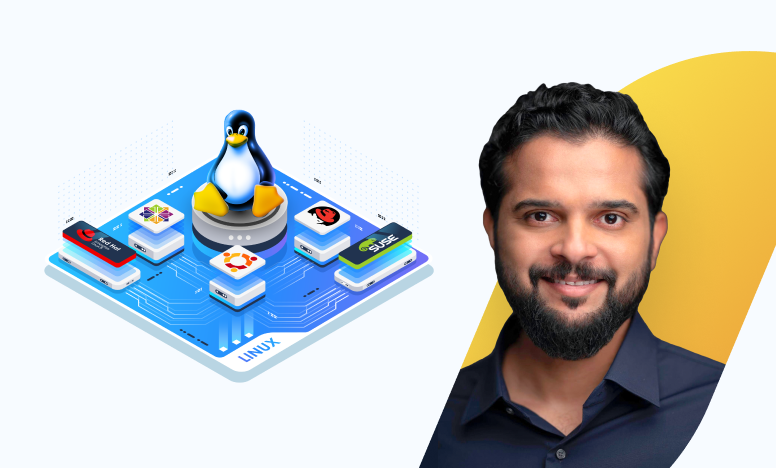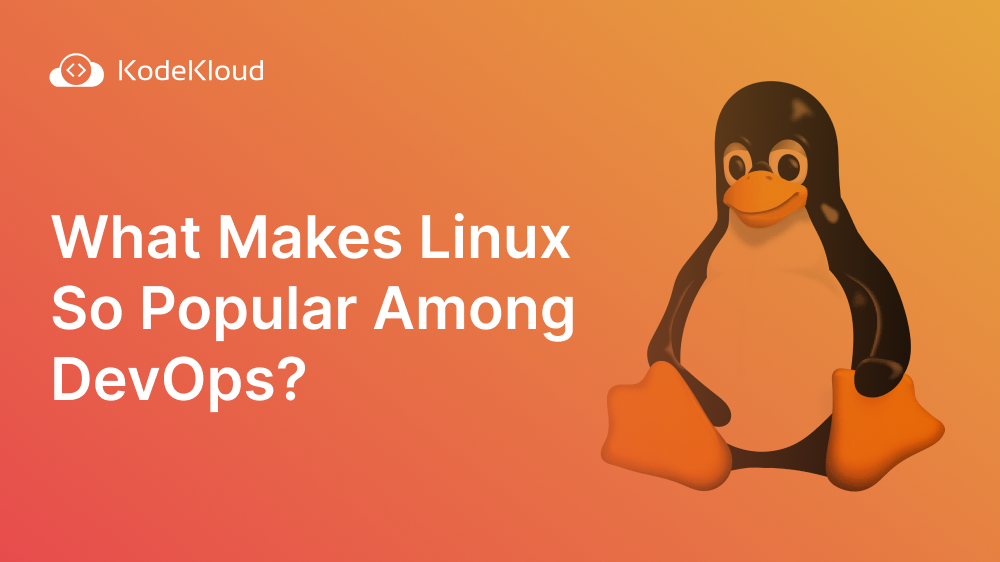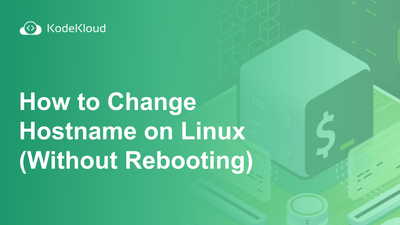Linux makes automation easy; hence, it has become an integral part of DevOps professionals. The best advice anybody can get while starting their journey in DevOps is to learn and understand the basics of Linux thoroughly. This makes the DevOps career path easy in the future. Linux is going to be there no matter what. You have to face it and work with it, to become a great DevOps engineer. Today, we will see why Linux is famous and the reasons that make it so popular among developers and DevOps engineers.
What is Linux?
Linux is a high-performing operating system that is completely free and closely resembles UNIX. It was created by Linus Torvalds, a student from the University of Helsinki in Finland, in 1991. Linus was dissatisfied with MS-DOS and desired a free version of UNIX for his new computer, which led him to develop Linux. Eventually, the project was supported and contributed to by many developers worldwide via the Internet.
Over time, developers started using and experimenting with Linux, and it gradually gained popularity among corporations, educational institutions, and governments.
Looking to gain or polish your Linux skills? Check out our Linux Basics Course & Labs

Linux stats
- In 2019, 100% of the world’s supercomputers ran on Linux.
- Linux runs on all of the top 500 Supercomputers, again!
- 96.3% of the world’s top 1 million web servers run on Linux.
- Every Facebook post you make, every YouTube video you watch, and every Google search you run is done on Linux.
- 95% of the servers that run the world’s top 1 million domains are powered by Linux.
- 85% of all smartphones are based on Linux.
5 Reasons You Should Learn Linux for DevOps
Open source
Linux is an open-source operating system that is available for free to everyone. Being open-source, the developers who are its members can always view and modify the source code as per their requirements. This feature of Linux has led to the creation of several customized versions of the operating system, which has helped several countries to develop their own OSs for specialized and strategic areas such as defense, communications, government, etc.
Enroll in KodeKloud's Open Source Course to understand how the open-source ecosystem works.
Customization
Linux is a highly customizable operating system that can be tailored to meet the specific needs of individual users. Depending on your level of expertise, there are various ways to customize Linux to suit your preferences.
One of the easiest ways to customize Linux is by changing the desktop environment. There are numerous desktop environments available for Linux, such as GNOME, KDE, Xfce, and LXDE. Each environment has its own look and feel, and you can choose the one that best suits your needs.
For more advanced users, Linux can be customized by modifying the source code of the operating system itself. This can be a complex and time-consuming process, but it allows for a level of customization that is not possible with other operating systems.
Free and Easy to use
Linux is a free and open-source operating system. This means that anyone can use, modify, and distribute its source code without any cost. Additionally, Linux has a vast repository of free and open-source software, which can be easily downloaded and installed from the internet. This makes Linux an attractive option for those who want to use a reliable and customizable operating system without breaking the bank.
Security
Linux is widely considered to be a secure operating system. Its security features are built into the core of the system, and it has a reputation for being much less vulnerable to viruses and malware than other operating systems. Additionally, Linux has a strong community of developers who work together to identify and address security vulnerabilities quickly.
However, like any operating system, Linux is not immune to security threats, and it's important to take steps to keep your Linux system secure. This includes keeping your software up to date, using strong passwords, and configuring your firewall properly.
Beginner Friendly
There are many user-friendly Linux distributions available that come with graphical interfaces similar to those found on other operating systems, making it easier for beginners to get started. There are also many online resources available for learning Linux, including tutorials, forums, and online communities where users can ask questions and get help. With dedication and persistence, anyone can become proficient in using Linux.
Automation
Linux is a popular choice for DevOps automation due to its flexibility, reliability, and open-source nature. Many tools used for DevOps automation, such as Ansible, Puppet, and Chef, are designed to work seamlessly with Linux systems. Linux also offers a wide range of command-line tools and scripting languages that allow for customized automation solutions.
With Linux, DevOps teams can easily automate tasks such as configuration management, deployment, and monitoring, making it easier to manage complex infrastructure and applications. As a result, Linux has become a go-to platform for many organizations looking to streamline their DevOps processes.
High endurance
The uptime and availability for Linux servers are very high. Linux has the highest number of servers running on the Internet. According to an article on the ZDNet website, 96.3 percent of the top 1 million Web servers run on Linux. Twenty-three out of the Top twenty-five websites run on Linux. The two remaining websites in the top twenty-five are live.com and bing.com, which belong to Microsoft.
Cause of High Demand for Professionals with Linux Skills
Below are some of the reasons why professionals with Linux skills are in high demand:
- Linux continues to dominate employers’ needs. Today, Linux is the highest-ranked skill in software development and the job market. According to dice.com, the demand for Linux experts is so heavy that some companies are even allowing employees to write their cheques on their own.
- The operating system capability is one of the great reasons why companies hire Linux experts. With the advancements in the cloud portfolio, firms are always in search of people who have skills with automation, private cloud, containers, orchestration, and server virtualization. We all know these are the characteristics through which Linux leads today’s cloud industry.
- DevOps is booming, and in DevOps, Linux knowledge is essential because it helps in automation. Firms look for such a combination of skills that fit well in the DevOps team.
- IT professionals seeking job security, good pay, career advancement, or raises – Linux is leading the industry. Linux is a versatile, robust, and scalable solution for IT companies of any shapes and sizes.
Tools Relying on Linux
Below are tools that seamlessly work and integrate with Linux:
#1. Kubernetes
Kubernetes is an open-source container orchestration platform that allows developers to automate the deployment, scaling, and management of containerized applications. Linux plays a critical role in the Kubernetes ecosystem as it provides the underlying infrastructure for running containers.
Kubernetes is designed to work seamlessly with Linux, leveraging its capabilities, such as namespaces, cgroups, and network namespaces, to create an isolated environment for running containers. Many organizations are adopting Kubernetes on top of Linux-based systems to improve their application deployment and management workflows.
With Kubernetes, teams can easily manage containerized applications at scale, ensuring high availability, fault tolerance, and efficient resource utilization. Linux's flexibility and reliability make it an ideal platform for running Kubernetes, enabling organizations to achieve greater agility and efficiency in their software development processes.
Learn more about how Kubernetes works from this blog: Kubernetes Tutorial for Beginners (Step by Step)
#2. OpenStack
OpenStack is a widely used open-source software platform for cloud computing, providing Infrastructure-as-a-Service (IaaS) functionality. Linux plays a significant role in the OpenStack ecosystem as it is the preferred operating system for running OpenStack deployments.
OpenStack is designed to work seamlessly with Linux, taking advantage of its powerful networking, storage, and virtualization capabilities. Linux provides a stable and reliable foundation for OpenStack, enabling it to deliver robust and scalable cloud services.
With OpenStack on Linux, organizations can build and manage private and public clouds, rapidly provisioning and managing virtual machines, containers, and other cloud resources. Linux's flexibility and security features make it an ideal platform for running OpenStack, enabling organizations to achieve greater agility and efficiency in their cloud computing operations.
#3. OpenDaylight
OpenDaylight is an open-source software-defined networking (SDN) platform that provides a framework for building and deploying SDN controllers. It is built on top of the Linux operating system and is designed to work seamlessly with Linux-based networking technologies.
Linux provides a stable and reliable foundation for OpenDaylight, enabling it to deliver robust and scalable SDN services. OpenDaylight leverages the networking capabilities of Linux, including its packet processing and forwarding capabilities, to create dynamic and flexible network topologies.
With OpenDaylight on Linux, organizations can build and manage complex SDN environments, enabling them to rapidly provision and manage network resources, automate network operations, and deploy new services more quickly. Linux's flexibility and security features make it an ideal platform for running OpenDaylight, enabling organizations to achieve greater agility and efficiency in their networking operations.
#4. Docker
Docker is an open-source platform for building, shipping, and running distributed applications. It is built on top of the Linux operating system and leverages many of its features to provide a highly efficient and scalable containerization solution.
Linux provides a stable and secure foundation for Docker, enabling it to create isolated environments for applications to run in without the need for a separate virtual machine. Docker uses Linux's cgroups and namespaces features to achieve this, allowing it to create lightweight and portable containers that can run on any Linux machine.
With Docker on Linux, developers can easily package their applications and dependencies into a single container, making it easier to deploy and manage applications across different environments. Linux's flexibility and security features make it an ideal platform for running Docker, enabling organizations to achieve greater efficiency and agility in their application development and deployment processes.
Learn more about how Docker works from this blog: What Is Docker in DevOps & How Does It Work?
Companies Using Linux
Many companies use Linux in some form or another, either as the primary operating system for their servers or as part of their software development stack. Some well-known companies that use Linux include:
1. Google: Google uses a customized version of Linux called Goobuntu for its internal operations.
2. Amazon: Amazon Web Services (AWS) uses Linux as the foundation for many of its cloud services.
3. Facebook: Facebook uses Linux extensively in its data centers and as the basis for its open-source projects.
4. IBM: IBM has been a longtime supporter of Linux and has contributed significantly to the development of the operating system.
5. Netflix: Netflix relies on Linux to power its video streaming service and uses a customized version of the operating system for its servers.
6. Twitter: Twitter uses a combination of Linux and other open-source software to run its social media platform.
These are just a few examples of the many companies that use Linux in their operations.
Test your Linux expertise with our FREE, fun, and challenging hands-on challenges.

Conclusion
Linux is here to stay, and it has become a must-know skill for everyone who is working on DevOps. It is one of the tried and most trusted solutions in the history of computer software. Longevity, maturity, and high security make Linux one of the most advanced and trusted OSes available today. Linux is an ideal solution for enterprises that want to use it and its peripherals to customize their own network and data center infrastructure. Having Linux knowledge is a boon and makes it easy for people to enter the DevOps career and get paid well.
Want to learn Linux's core concepts? Watch this video.
Linux Tutorial for Beginners
More on Linux:
- Learn Shell Scripting By Doing
- How to Learn Linux in 2023 (with Resources)
- Top 7 Reasons to Learn Linux
- Ubuntu vs. Redhat (Rhel): Which One Should You Learn?
- Cloud Engineer vs. DevOps Engineer: Overview, Similarities & Differences
- Why Are DevOps Salaries so High? (Over $130,000 / year)
- Top 7 Skills Required for DevOps Engineers in 2023 (with Roadmap)
- How to Get into DevOps

















Discussion